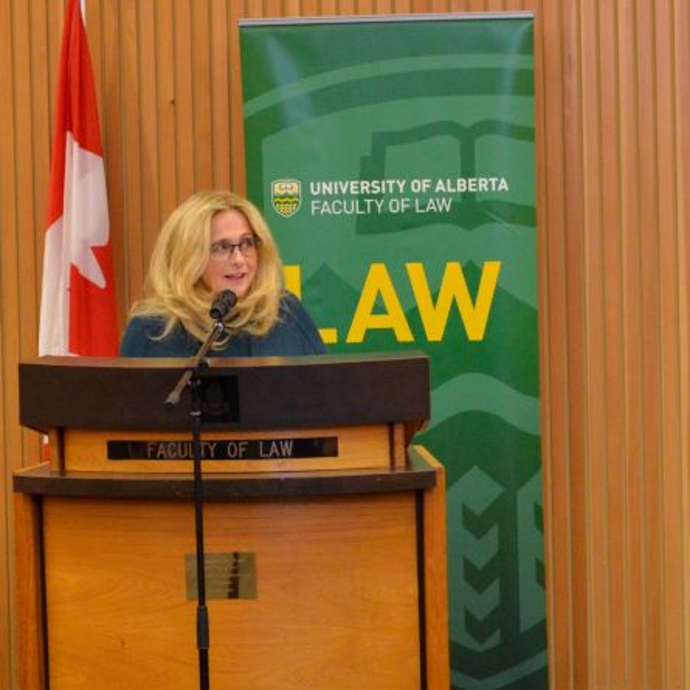
The Honourable Sheilah Martin, '83 LLM, a justice of the Supreme Court of Canada, addressed the University of Alberta Faculty of Law community on October 1, stressing that the study of law is vital in the current age of misinformation.
The most important skills current law students can learn is "how to engage in respectful debate with others when you disagree ... these skills are at the core of being contributing citizens in a vibrant democracy,." she said.
Well-articulated ideas are the most powerful currency this era possesses, she continued, urging emerging lawyers to pursue and practise their facility with the legal profession's historical strengths, including reliability and credibility.
"Everyone may hope the arc of history is against tyranny, but unless we use our skills to be sure that's the case, it will not be the case."
Martin is the second Supreme Court justice to visit the Faculty this semester. The Honourable Rosalie Silberman Abella delivered an Orientation Week welcome speech to incoming law students on September 4.
Martin has a long and notable history with the legal profession in Alberta and western Canada.
While earning her master's of law from UAlberta Law in 1983, she worked as a researcher and law professor at the University of Calgary from 1982 to 1986.
In 1991, she received her doctorate of Juridical Science from the University of Toronto, but from 1991 to 1996 was acting dean and then dean of the University of Calgary's Faculty of Law.
She practised as a criminal and constitutional lawyer in Calgary from 1996 to 2005, when she was appointed to the Court of Queen's Bench of Alberta. Martin was appointed to the Supreme Court of Yukon in 2009, the Courts of Appeal of Alberta, the Northwest Territories and Nunavut in 2016, and elevated to the Supreme Court in 2017.
MONTREAL CHILDHOOD
Her dedication to working for justice began in Montreal, however, where she grew up during the 1960s and 1970s.
"All around me I saw people being bullied or marginalized or discriminated against because of a characteristic that they didn't choose, and I didn't think that was an appropriate way to treat people," Martin told UAlberta Law's alumni magazine, Without Prejudice, early in 2019.
"Why wasn't I allowed to play football with the boys? Why couldn't English students attend French school? Why were there separations based on people's religion, language, race?"
Her desire to ensure fairness and justice for all has propelled Martin through a high-profile career that included prominent involvement in David Milgaard's precedent-setting wrongful conviction compensation award, and as a judge, granting Canada's first court approval for physician-assisted death, two of many significant cases.
Her earlier immersion in legal scholarship benefited her greatly, Martin says.
"As an academic, your goal is to master a topic. I really liked being 10 questions deep on a subject. I liked that I knew everything that existed about a topic, so that I felt I had legitimacy behind my opinions."
MILGAARD SETTLEMENT
Among her most persuasive opinions was the brief she wrote to help support the $10-million dollar settlement for Milgaard, Canada's longest-serving prisoner before he was released after 23 years in prison for a rape and murder he did not commit. After poring over his prison records and interviewing him and his family, she highlighted that he could have likely been freed after seven years if he had admitted to the crime. Despite difficult prison conditions, he refused, and as she later wrote, "with this strength of character who could this young man have been if his life had not been interrupted by his wrongful conviction?"
Martin also did foundational work on the 2005 Indian Residential Schools Settlement Agreement, which ended the need for each Indigenous survivor seeking compensation to prove personal victimization and instead acknowledged familial, community and intergenerational harms.
She made numerous other socially and legally significant decisions while on the Court of Queen's Bench, to which she was appointed in 2005.
In 2016, she issued Canada's first judicial approval for physician-assisted death, and then several subsequent approvals, cases she calls the most intense and meaningful of her career.
In the 2012 trial of Dustin Paxton, who was convicted of torturing his roommate, Martin declared him a dangerous offender in a complex case marked by several rare events. These included permitting accredited media to use instant messaging technology within the courtroom, one of the first such rulings in Canada. At the end of the trial, Paxton's counsel became witnesses in an (ultimately unsuccessful) application to stay proceedings. Managing that unusual situation, Martin made a notable decision that disputed a call for her recusal.
"I think the thing you learn from all your cases is, you have to work really hard on each individual case," says Martin. "Each has its own facts and issues and you really have to dig down on each matter."
She credits UAlberta Law's Interim Dean David Percy for teaching her the rudiments of how to do that during her master's studies.
"I didn't know how to construct a big argument and write very well. He, the school, the program made sure I learned how to ask the deeper questions."